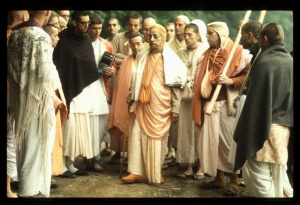CC Adi 6.99 (1975): Difference between revisions
(Vanibot #0027: CCMirror - Mirror CC's 1996 edition to form a basis for 1975) |
(Vanibot #0020: VersionCompareLinker - added a link to the Version Compare feature) |
||
| Line 2: | Line 2: | ||
<div style="float:left">'''[[Sri Caitanya-caritamrta (1975)|Śrī Caitanya-caritāmṛta (1975)]] - [[CC Adi (1975)|Ādi-līlā]] - [[CC Adi 6 (1975)|Chapter 6: The Glories of Śrī Advaita Acārya]]'''</div> | <div style="float:left">'''[[Sri Caitanya-caritamrta (1975)|Śrī Caitanya-caritāmṛta (1975)]] - [[CC Adi (1975)|Ādi-līlā]] - [[CC Adi 6 (1975)|Chapter 6: The Glories of Śrī Advaita Acārya]]'''</div> | ||
<div style="float:right">[[File:Go-previous.png|link=CC Adi 6.98 (1975)|Ādi-līlā 6.98]] '''[[CC Adi 6.98 (1975)|Ādi-līlā 6.98]] - [[CC Adi 6.100 (1975)|Ādi-līlā 6.100]]''' [[File:Go-next.png|link=CC Adi 6.100 (1975)|Ādi-līlā 6.100]]</div> | <div style="float:right">[[File:Go-previous.png|link=CC Adi 6.98 (1975)|Ādi-līlā 6.98]] '''[[CC Adi 6.98 (1975)|Ādi-līlā 6.98]] - [[CC Adi 6.100 (1975)|Ādi-līlā 6.100]]''' [[File:Go-next.png|link=CC Adi 6.100 (1975)|Ādi-līlā 6.100]]</div> | ||
{{CompareVersions|CC|Adi 6.99|CC 1975|CC 1996}} | |||
{{RandomImage}} | {{RandomImage}} | ||
==== TEXT 99 ==== | ==== TEXT 99 ==== | ||
| Line 32: | Line 31: | ||
<div class="purport"> | <div class="purport"> | ||
A fraction of a particular thing is called a part, and that from which the fraction is distinguished is called the whole. Therefore the fraction, or part, is included within the whole. The Lord is the whole, and the devotee is the part or fractional part. That is the relationship between the Lord and the devotee. There are also gradations of devotees, who are calculated as greater | A fraction of a particular thing is called a part, and that from which the fraction is distinguished is called the whole. Therefore the fraction, or part, is included within the whole. The Lord is the whole, and the devotee is the part or fractional part. That is the relationship between the Lord and the devotee. There are also gradations of devotees, who are calculated as greater and lesser. When a devotee is great he is called prabhu, and when he is lesser he is called bhakta, or a devotee. The supreme whole is Kṛṣṇa, and Baladeva and all Viṣṇu incarnations are His fractions. Lord Kṛṣṇa is therefore conscious of His superior position, and all Viṣṇu incarnations are conscious of Their positions as devotees. | ||
</div> | </div> | ||
Latest revision as of 19:10, 26 January 2020

A.C. Bhaktivedanta Swami Prabhupada
TEXT 99
- jyeṣṭha-bhāve aṁśīte haya prabhu-jñāna
- kaniṣṭha-bhāve āpanāte bhakta-abhimāna
SYNONYMS
jyeṣṭha-bhāve—in the emotion of being superior; aṁśīte—in the original source of all incarnations; haya—there is; prabhu-jñāna—knowledge as master; kaniṣṭha-bhāve—in an inferior conception; āpanāte—in Himself; bhakta-abhimāna—the conception of being a devotee.
TRANSLATION
The source of all incarnations has the emotions of a superior when He considers Himself the master, and He has the emotions of an inferior when He considers Himself a devotee.
PURPORT
A fraction of a particular thing is called a part, and that from which the fraction is distinguished is called the whole. Therefore the fraction, or part, is included within the whole. The Lord is the whole, and the devotee is the part or fractional part. That is the relationship between the Lord and the devotee. There are also gradations of devotees, who are calculated as greater and lesser. When a devotee is great he is called prabhu, and when he is lesser he is called bhakta, or a devotee. The supreme whole is Kṛṣṇa, and Baladeva and all Viṣṇu incarnations are His fractions. Lord Kṛṣṇa is therefore conscious of His superior position, and all Viṣṇu incarnations are conscious of Their positions as devotees.